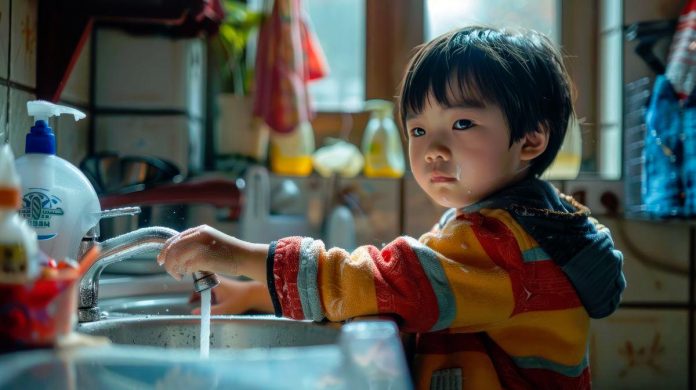A growing trend in China, known as “reverse parenting,” has parents relaxing at home while their children handle household responsibilities after school.
This viral phenomenon showcases children stepping into the role of the caretaker, while parents enjoy a more leisurely lifestyle.
Yuanyuan, a primary school student from Liaoning province, has become a sensation on Chinese social media, gaining nearly one million followers for documenting his daily life with a mini camera attached to his clothes.
ALSO READ: Woman in China earning RM1.6k lives in company toilet pays RM31 to save on rent
Every week, Yuanyuan rises at 5 am to walk his neighbors’ dogs for five yuan (approx. RM3) each, South China Morning Post reported.
After school, he takes charge of the household, calling his mother to ask for dinner preferences, shopping for groceries, and bargaining with vendors.
At home, he prepares meals like braised prawns and pork ribs, serving two meat dishes and a vegetable. When dinner is ready, he calls his mother, who is often watching TV, to come and eat.
His mother, impressed with his ability to juggle school work and housework, praises his cooking skills, which he honed through online videos. Yuanyuan also assists with his mother’s makeup and picks out her outfits, offering compliments and cheering her up when she’s feeling down.
Yuanyuan has become a poster child for reverse parenting, a trend where children take the lead and parents relax.
The trend has gained significant attention, with some parents mimicking their children’s laid-back habits, spending time on their phones and watching TV while their kids manage daily tasks.
This shift in family dynamics has sparked a wave of viral content. In February, a video featuring a four-year-old boy scolding his parents for being lazy garnered nearly 1.4 million likes.
The video shows the parents lounging in bed all afternoon while the boy points out a dusty toilet lid and messy bookshelf. “I had to clean everything and even sweep the floor,” he says, adding, “You two are not doing anything. I cannot take it any more!”
The mother responds, claiming that they rely on him because he is so capable. The boy retorts, “Might as well work me to death.”
In another example, Nini, a mother who has embraced reverse parenting, shared how her seven-year-old daughter handles the family’s travel plans.
After a trip to Hong Kong went awry due to a mix-up with the return flight time, the daughter took charge. “Since then, my daughter does not trust adults with travel plans,” Nini explained. “She now uses social media platforms to research destinations herself.”
Experts argue that reverse parenting can challenge traditional parental authority and help foster independence in children. “Parents showing a bit of ‘weakness’ can inspire kids to take more responsibility and be more proactive,” said Zhang Jianyong, a child social worker from Hubei province.
The reverse parenting movement has gained significant traction online, with related content accumulating over 230 million views on mainland social media.
One observer shared, “I used to get frustrated with how slowly my son got ready. One day, I copied his pace and took an hour to dress. He could not take it and rushed me. He has never been slow again.”








